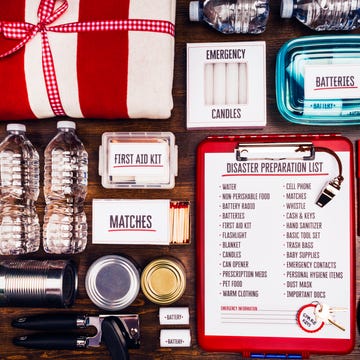As a relationship counsellor and psychotherapist, Anna Williamson has worked with hundreds of couples. Add her work as a TV dating expert – working on shows such as Celebs Go Dating – and you could probably, she says, bump that up to a thousand. She knows a lot about what makes relationships work, and the reasons why they sometimes don’t, even more since she recorded her new podcast: The Affair… With Anna Williamson.
In it, she speaks to people affected by and involved in infidelity – from the ‘cheat’ and the ‘other woman’ to the ‘victim’ – exploring what happened and why. Every situation is different, she says, ‘But what we absolutely know is that this age-old stereotype of the main protagonist, the cheat, as an out-and-out wrong ’un, and the person they’re cheating with being some shameless harlot, twirling their hair round a finger, luring that person in… they need to be completely smashed.’
Many of the ideas we have about infidelity are wrong, she suggests. They may comfort us, but they don’t help us understand, or heal from, affairs. So what do we need to know?
It’s not about lust
‘In my experience of working with people who have been involved in affair, the motivation is usually the complete opposite of the stereotype in which a physical need is met with a quickie,’ says Anna. ‘Most people are seeking emotional validation, not physical attraction. They’re lonely, and it’s actually an emotional connection that they’re craving. Everyone we spoke to in the podcast said that a huge part of their affair was deep and meaningful, emotional conversations. And many people describe their affair as their best friend.’
If you’re honest with yourself, you’ll often know it’s happening (and why)
‘The majority of the time, we know if something is a bit off kilter – if our partner’s not communicating with us, is a bit “off”, dismissive or even overly affectionate,’ says Anna. ‘Often, the signs of an affair are there, but we choose to not look for them because we’re not prepared to deal with the ramifications.’
There’s more, she suggests. While there are plenty of exceptions, ‘there are often elements of their own actions or behaviours that – if we’re being completely fair – have played into how things have panned out,’ she says. ‘They may have been prioritising other things, other people or other needs over their partner. Perhaps not wanting to engage in communication, shutting their partner down or stonewalling them so they feel completely shut out and have sought solace elsewhere.’ Which is not to say it’s their fault, of course, rather that it’s rare you find a situation in which one partner is a pantomime villain.
The other woman is rarely a seductress
‘When I’ve spoken to the “other woman” on the podcast, it’s sometimes been the case that the relationship was actually abusive for them – that it was coercively controlling, for example,” says Anna. Every dynamic is different but: ‘It very rarely fits the Hollywood stereotype of someone conquettishy dressing up like Jessica Rabbit.’
It’s not a lot of fun
‘Most of the people we spoke to said that having an affair was an absolute emotional rollercoaster,’ says Anna. ‘They ended up highly stressed, and the lows far outweighed the highs.’
The person who’s cheated on also has to work to repair the relationship
Recovering from infidelity and staying together involves ‘bringing your relationship back to its bare bones and its foundations: trust, vulnerability, transparency, respect,’ says Anna. While the person who has been cheated on may be the injured party, they’ll have a lot of work ahead of them, too.
First, suggests Anna, both parties have to fully and honestly ‘purge their feelings and emotions and own their role in the situation’. The cheater will need to be open and honest, not only about what they’ve done but why. The person who’s been cheated on has to be really honest, not only about how they feel but also what, if anything, they could have done differently. ‘Trust gets rebuilt by being completely honest, completely transparent,’ says Anna.
This purge is only start, however. Once done, ‘there has to be a clear agreement that you’ll both move forward,’ she says. That means: ‘refusing to allow the past to creep back in and the hurt of the affair to create cracks in the relationship again,’ she explains. ‘The person who’s been cheated on has to make a very hard decision within themselves not to bring that into the present and future, or to weaponise it against their partner.’
You may not be able to, or not want to. And that’s absolutely fine, says Anna. But it’s what the relationship will require if you’re to rebuild stronger.
Healing from an affair can strengthen a marriage
Anna isn’t recommending affairs – far from it. Her accounts make the prospect sound distinctly unglamorous, stressful and miserable. That said, ‘When the work to recover from an affair is done correctly and together as a team, I’ve seen some of the most healthy and fulfilling relationships result from it,’ she says. It may not be a palatable sentiment but the truth, as she’s witnessed it firsthand is this. ‘Many people emerge from that process and say, “My God, that affair made us bigger, better and stronger than ever.”’
The Affair… With Anna Williamson is available now on Spotify, Apple Podcasts, Amazon Music and all major podcast platforms.













